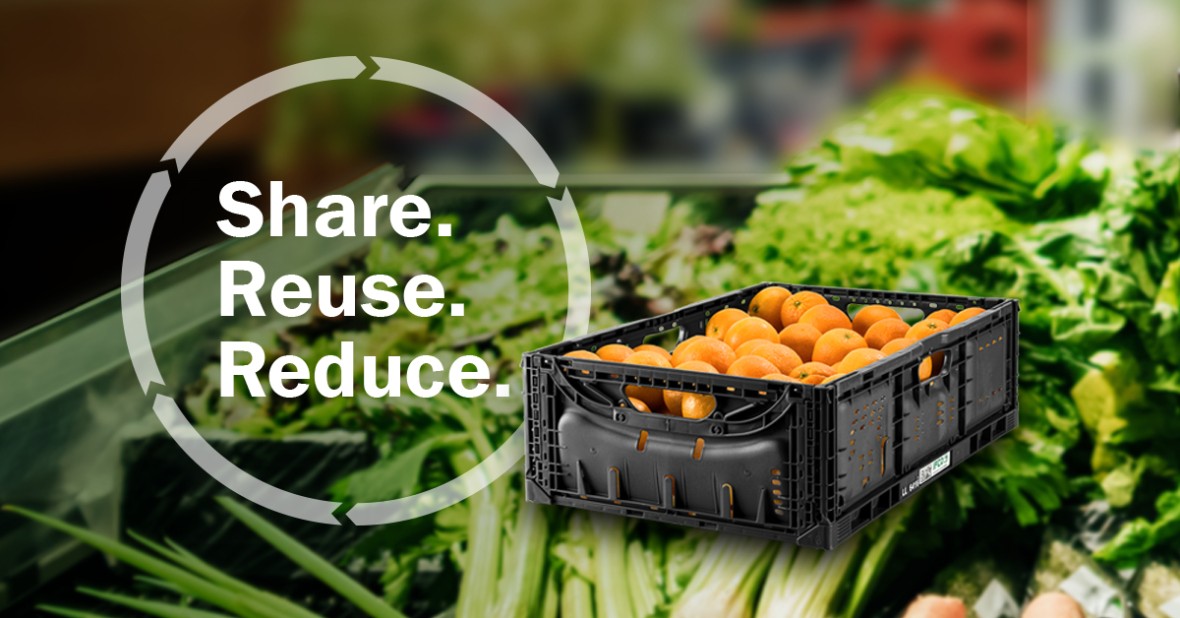Not a day goes by without some news story or company report related to delays and disruptions in yet another overtaxed supply chain. Understandably, logistics expertise has moved out of the shadows of the back office and firmly into the limelight. Weaknesses in legacy systems have been exposed and future-oriented alternatives are in high demand. I believe this is one of the contributing factors to the uptick in interest in the pooling of reusable packaging.

The pooling of reusable packaging is not synonymous with the leasing or renting of supply chain assets. This is a common assumption, but it’s important to differentiate between the two options to comprehend the clear benefits. For clarity and simplicity, I’ll start with an explanation of an asset that most people would have no problem relating to, namely cars.
When you rent or lease a car, you generally pay for exclusive access to one specific vehicle. Only you (and maybe a few other select people) can drive that one car whenever you need it. It’s always available. That’s the upside. But there’s a considerable downside.
When you don’t need it, this leased asset sits idle in your garage or blocking your drive. Some studies estimate that the average car is parked 95% of the time. That’s a terrible waste of a valuable resource,

especially when there are other people who could be making good use of that asset during your downtimes. Not only that, depending on your lease agreement, you may also be tied in to using that one car for longer periods and will likely miss out on more energy-efficient models or technology upgrades as a result.
Leasing or renting can therefore be very restrictive. Moreover, you’ll usually have to cover the extra expenses such as fuel, damages and repairs.
In contrast, the pooling of cars – or carsharing – creates a supply of vehicles that is available to more than one person at any time. The more users in the pool, the better the service, availability and usage is likely to be. A better service increases the likelihood of other drivers joining the pool and sharing the cars, thereby reducing the costs and increasing efficiencies for everyone. As a result, a virtuous circle begins.
Other upsides? Cleaning, maintenance and repairs are usually covered by the pooling company. Given these benefits, pooling generally offers more flexibility and adaptability to drivers at a lower cost. Lower overall costs can also be achieved because when a pool of assets reaches a critical scale, the pooling company can balance the pool by attracting customers whose journeys return the assets to their original locations, rather than having to pay the cost of doing this rebalancing exercise. When this happens, all the users of the pool benefit.
Ultimately, people who sign up for carsharing models get what they really want, which is not car ownership, but mobility on demand.

What does the pooling of reusable packaging from IFCO have in common with car pools or carsharing? The main correlation lies in the divided use of resources. Keeping products in use drives better utilization of resources. By sharing standardized assets between multiple parties — whether cars or containers — you maximize asset utilization.
In the case of IFCO Reusable Packaging Containers (RPCs), the scale of our operations and our finely tuned logistics system ensure that the shared assets are available in premium condition when required and kept in continuous circulation. They are never left idle or unproductively block your storeroom.
Just as with carsharing, sharing IFCO RPCs achieves significant cost efficiencies for the user. This is thanks in part to the sharing of labor, repairs and wash centers, for instance, but also because the IFCO pool is large enough to manage the rebalancing of assets. The size and scale of our operation attracts customers whose fresh produce flows help to rebalance the pool.
As you only pay for the actual usage of the RPCs — and not for the rent of any unused assets sitting idle — you also considerably reduce your capital expenditure and have transparency over operating expenditure.
The benefits of sharing supply chain assets go much further than my simple analogy with cars.

Standardized packaging solutions that multiple users share offer a very important advantage over other types of assets. Most notably, a standardized approach significantly facilitates the automation of the fresh grocery supply chain. When multiple users adopt the same base design of reusable crate, the cost of automation across the industry can also be reduced. How so? Once optimized with standardized dimensions, the automation equipment
can be replicated easily for different producers, distribution centers and retailers. In addition, we see huge advantages in the reverse logistics of transit packaging. Cross-compatibility of standardized crates in return journeys, paired with the minimal height of our foldable crates, significantly reduces transport costs and emissions.
We now operate a pool of 325 million reusable containers, so we can maintain a supply of RPCs at the optimum level to ensure availability for all members of the pool. This pool enables over 1.9 billion trips per year, serves more than 300 retailers and more than 15,000 growers across five continents and in 50 countries.
Operating at such a scale means that we can invest in best-in-class systems and in the sustainable pooling of reusable packaging innovations. Most importantly, we do invest.
Recently, we have taken measures to accelerate washing and sanitizing processes, improve the sorting technology in our washing centers and enhance the traceability of our pooled assets. This is the type of investment that cuts down on turnaround times of reusable crates to boost overall supply chain efficiency. It is also only feasible at scale.
“A well-designed pooling system such as our own, serves as a model of resource efficiency”
Even though the service life of our RPCs can average up to an impressive ten years, our pooling system has also been designed with the end of service in mind. We take care of the RPCs when they need repairing, but also when they can no longer be repaired. At that point – on average after up to 120 cycles of use – all damaged RPCs are granulated and fed into our manufacturing process, which ensures 100% material reutilization. We produce new IFCO RPCs from old, with no loss of quality.
Ultimately, a well-designed pooling system such as our own, serves as a model of resource efficiency. With our approach, there is zero waste. Overall, fewer supply chain assets are needed. This cuts down on materials and manufacturing processes, which reduces energy and water consumption.
Sharing and pooling reusable packaging reduces product lifecycle emissions and supports the decarbonization of the fresh grocery supply chain. What’s more, pooling assets frees up our customers so they can focus on what they do best. While we focus on what we do best.

Stay up to date
Want the latest fresh food packaging industry knowledge delivered straight to your inbox? Subscribe to our newsletter and get the latest news, trends, articles and more!
